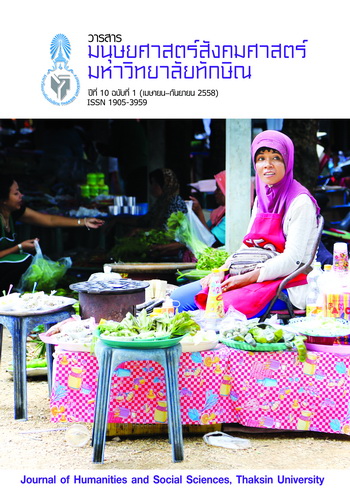การจัดการความรู้บนฐานทุนทรัพยากรธรรมชาติ เพื่อการท่องเที่ยวชุมชน อำเภอสทิงพระ จังหวัดสงขลา
Main Article Content
บทคัดย่อ
การวิจัยเรื่องการจัดการความรู้บนฐานทุนทรัพยากรธรรมชาติเพื่อการท่องเที่ยว
ชุมชนอำเภอสทิงพระจังหวัดสงขลามีวัตถุประสงค์เพื่อศึกษากระบวนการในการ
จัดการความรู้ของชุมชนปัจจัยที่ส่งผลต่อการจัดการความรู้ของชุมชนผลจากการ
จัดการความรู้ของชุมชนและศักยภาพแหล่งท่องเที่ยวของชุมชนโดยการเลือกกลุ่ม
ชาวบ้านในอำเภอสทิงพระที่มีผลการดำเนินการจัดการความรู้บนฐานทุน
ทรัพยากรธรรมชาติเพื่อการท่องเที่ยวเป็นที่รู้จักและยอมรับของชาวบ้านในพื้นที่และ
บุคคลทั่วไปอย่างกว้างขวางมาเป็นกลุ่มตัวอย่างจำนวน2กลุ่มได้แก่1.ศูนย์เรียนรู้
ภูมิปัญญาชาวบกตำบลจะทิ้งพระและ2.ชมรมท่องเที่ยวเชิงอนุรักษ์วิถีโหนดนาเล
ตำบลท่าหินมีวิธีดำเนินการวิจัยเชิงคุณภาพโดยเก็บรวบรวมข้อมูลภาคสนามด้วยวิธี
การสัมภาษณ์สังเกตและถ่ายภาพประกอบเป็นหลักผลการศึกษาพบว่ากลุ่มชาวบ้าน
ในพื้นที่อำเภอสทิงพระที่จัดตั้งขึ้นเพื่อพัฒนาชุมชนบนฐานทุนทรัพยากรธรรมชาติ
ของชุมชนจำแนกตามวัตถุประสงค์ของการจัดตั้งกลุ่มได้เป็น2ลักษณะคือการจัดการ
กลุ่มโดยผู้นำและมีที่ปรึกษาคณะกรรมการของศูนย์ได้แก่ศูนย์เรียนรู้ภูมิปัญญาชาวบกมีวัตถุประสงค์เพื่อพัฒนาชุมชนครอบคลุมทุกๆด้านได้แก่การอบรมหลักสูตรอาชีพ
จากทรัพยากรธรรมชาติท้องถิ่นการจัดการนำเที่ยวชุมชนการจัดทำผลิตภัณฑ์ชุมชน
และกลุ่มที่มีการจัดการกลุ่มโดยผู้นำและมีสมาชิกของชมรมได้แก่ชมรมท่องเที่ยว
เชิงอนุรักษ์วิถีโหนด นา เลมีวัตถุประสงค์เพื่อพัฒนาชุมชนโดยใช้การท่องเที่ยวเป็นเครื่องมือ กลุ่มชาวบ้านจะเน้นการจัดการความรู้บนฐานทุนทรัพยากรธรรมชาติ
เพื่อการท่องเที่ยวชุมชน มีขั้นตอนหลักๆ ได้แก่ 1. การกำหนดปัญหาที่ต้องการที่
สอดคล้องกับชื่อและวัตถุประสงค์ของกลุ่มเพื่อการพัฒนาชุมชนจากการท่องเที่ยว 2.
การแลกเปลี่ยนเรียนรู้ระหว่างผู้นำ กรรมการและสมาชิกภายในกลุ่มคณะบุคคลอื่น
ที่มาศึกษาดูงานของกลุ่ม หรือกลุ่มไปศึกษาดูงานที่กลุ่มอื่น ๆ 3. การยกระดับความรู้
และการประยุกต์ใช้ความรู้ จากความรู้ที่ฝังลึกในคน กลายมาเป็นความรู้ที่เปิดเผย นำไปเป็นแนวปฏิบัติการเรียนรู้วิถีชีวิตชุมชนและหลักสูตรผลิตภัณฑ์ชุมชน 4. การสืบสานต่อความรู้ ให้กว้างขวางและเป็นประโยชน์ต่อคนรุ่นต่อ ๆ ไปด้วย การจัดการความรู้ของกลุ่มส่วนใหญ่ประสบผลสำเร็จด้วยดีเนื่องจากมีปัจจัยหลายอย่างเป็นปัจจัยสนับสนุน ที่สำคัญได้แก่ การมีผู้นำที่มีความรู้ความสามารถและมีความมุ่งมั่นตั้งใจสูง
ในการดำเนินงานของกลุ่ม และการได้รับการสนับสนุนจากหน่วยงานภาครัฐและ
หน่วยงานอื่นที่สนใจในงานพัฒนาชุมชนด้วยกัน ส่วนปัจจัยที่เป็นอุปสรรคต่อการจัดการความรู้ เกี่ยวกับ การสร้างผู้นำสำหรับเยาวชน การฟื้นฟูอาชีพในชุมชน การจัดการความรู้ของกลุ่มได้ก่อให้เกิดผลในทางพัฒนาทั้งที่เป็น การพัฒนาคน พัฒนากลุ่ม และพัฒนาชุมชน การพัฒนาศักยภาพให้เกิดเป็นแหล่งท่องเที่ยวชุมชนมีการจัดการอย่างมีประสิทธิภาพโดยมีผู้นำกลุ่มมีบทบาทที่สำคัญและการมีส่วนร่วมภาคีเครือข่ายการส่งเสริม
ให้เยาวชนเข้ามาเรียนรู้วิถี โหนด นา เล มีการจัดการพัฒนาคุณภาพชีวิตตามหลัก
เศรษฐกิจพอเพียง การทำผลิตภัณฑ์ชุมชนให้มีคุณภาพ ช่วยส่งเสริมการอนุรักษ์มรดกทางวัฒนธรรมวิถีชีวิตชุมชนโหนด นา เล การเผยแพร่ภูมิปัญญาด้านทรัพยากรผ่านการท่องเที่ยวเชิงนิเวศ ซึ่งล้วนแต่มีคุณค่าต่อการพัฒนาคุณภาพชีวิตอย่างยั่งยืน
เกิดผลผลิต และผลประโยชน์ของการจัดการความรู้จากศักยภาพการเป็นแหล่งท่องเที่ยวชุมชน ในพื้นที่อำเภอสทิงพระ
The objectives of the research entitled “Natural Resources-Based Knowledge
Management for Community Tourism in Satingpra District, Songkhla Province.”
were to study 1) procedures of the knowledge management of the groups,
2) factors influencing the knowledge management of the groups, 3) the outcomes
of the knowledge management of the groups, and 4) potential of community
tourism site. The study selected two community groups in the area of Satingpra
District, involved with the knowledge management based on natural resources
capitals and whose works were prominent and recognized widely by the people
in the area. The two groups serving as the sample of the study included
1. Learning center of the wisdom called “Chow-Bok” Group 2. The way of life
for Eco-Tourism called “Nod Na Le” Group, Satingpra district, Songkhla province.
The research utilized the qualitative approach by collecting field data mainly
through interviews, observations and photography. Related additional documentary
data were also collected for the study. The findings of the study reveal the
following.
The villagers’ groups in the area of Satingpra district for the purpose of
community development based on natural resources capitals of the community
can be classified generally into two categories. The first type is the group
established for the leader of community with a broad committees called Learning
center of the wisdom called “chow-book” and the objective for all community
development such as training by the curriculum of using from local natural
resources, community tourism management, production of the local goods,
belongs to this category. The other type is the group established for the leader
of community with a member committees called The way of life for eco-tourism
called “Nod Na Le” Group, belong to this latter category and the objective for
using tourism in order to community development. These groups concentrate
on “knowledge management” based on the natural resources capitals of the
communities as guideline for the operation and development of the work. In
principle, group employs the similar method or procedure of knowledge
management, and the major steps taken include the following : 1. Specifying
the problems –the problem that matches the theme or the objective of the group;
2. Sharing of learning from the problem between head of group, committees
among members within the group. Besides, learning is also shared with other
visiting groups or personnel or when the group itself visiting the others; 3.
Knowledge of learning is elevated and applied, thus turning the “embedded
knowledge” into “revealed knowledge” capable of using it as guideline for
the performance and product community development curriculum;
and 4.The knowledge is carried on by imparting to the general public and for
inheritance by future generations. Knowledge management carried out by the
groups is mostly successful due to supporting factors. For example, the group
leaders who are knowledgeable and committed and good supports from the
government agencies and other organizations related to community development
work contribute to the group’s achievement. Barrier factors of the groups is
unsuccessful due to develop the young generation future, recover the occupation
in community. Knowledge management of the group contributes to different
aspects of development at individual, group and community level. The potential
of community tourism development are managed by capability of group leader
and participation network and promote the young people to learn the way of
life that called “Nod-Na-Le” and learn the method of “sufficient economy” by
doing the community product and promote the conservation of cultural heritage,
all of which are valuable to the quality sustainable development of life for output
and outcome of the knowledge management from the potential of the communities
tourism product in Satingpra district.
Article Details

อนุญาตภายใต้เงื่อนไข Creative Commons Attribution-NonCommercial-NoDerivatives 4.0 International License.


